This week we talk to our old friend Chris Shelton about cult apologists. These are the people who make a career (often lucrative) out of offering expert academic opinions in support of “New Religious Movements” — cults. It’s a racket that scientology has used to gain credibility. We cover a lot of ground here. Chris has recently published a series of articles on this topic on Tony Ortega’s blog — they are well-worth reading.
You can listen to the episode here.
Chris also has a podcast that is worth subscribing to on YouTube: Sensibly Speaking Podcast
We mention the scientology STAND League — the OSA operation that pretends to defend religious freedom and human rights, though it is actually a vehicle for religious hate directed at those who choose not to be scientologists and tell the world what really goes on inside scientology. Stefani Hutchinson, at her excellent blog: Confront and Shatter, has regularly torn apart the hypocrisy of the STAND League.
Chris’ articles on Ortega’s blog recently:
Academics who ignore defectors as ‘apostates’ will never see Scientology for what it is
Is it really possible to study Scientology and ignore the people who were damaged by it?
Religion professor complains that no one wants to hear the good news about Scientology
Profs looking at tiny groups of American ‘indies’ miss Scientology’s big issues
Scientology’s academic champion: An eager copyright attorney who shills with alacrity
We mention a number of people….
Professor Bryan Wilson of Oxford University: He was President of the International Society for the Sociology of Religion and wrote several influential books on new religious movements. He was the godfather of religious scholars on “new religious movements” and popularized the idea that “apostates” (ie former members) offered up horror stories that could not be believed.
Massimo Introvigne — see also the article from Chris Shelton above and also the articles on Tony Ortega’s blog concerning him and his attacks on scholars who expose scientology.
The Remnant Fellowship.org website featuring cult apologists Gordon Melton and Donald Westbrook responding to the HBO documentary about Remnant Fellowship The Way Down

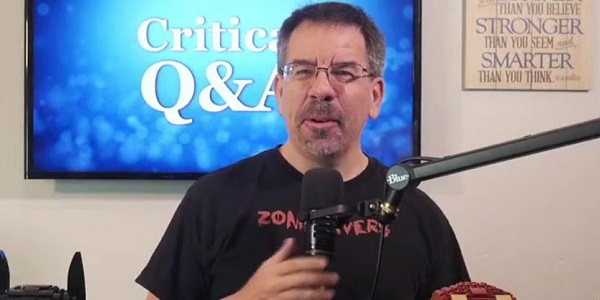
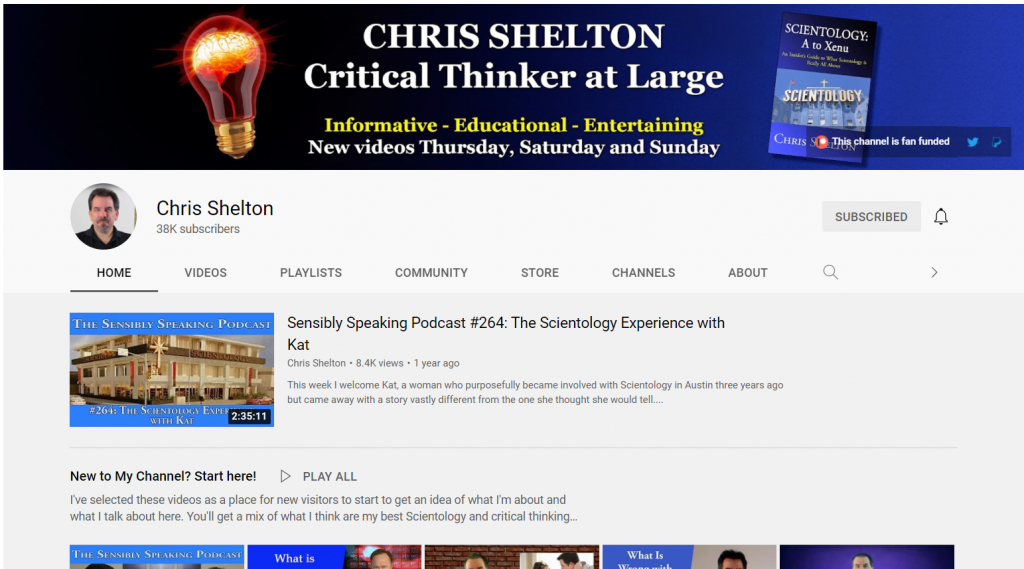

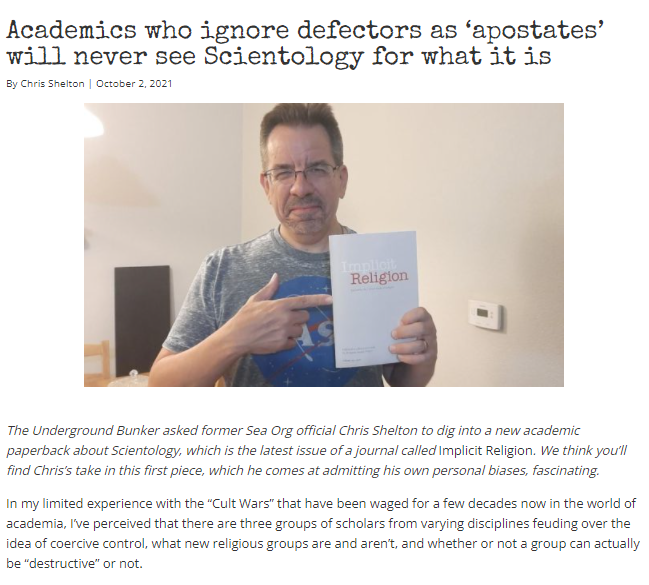
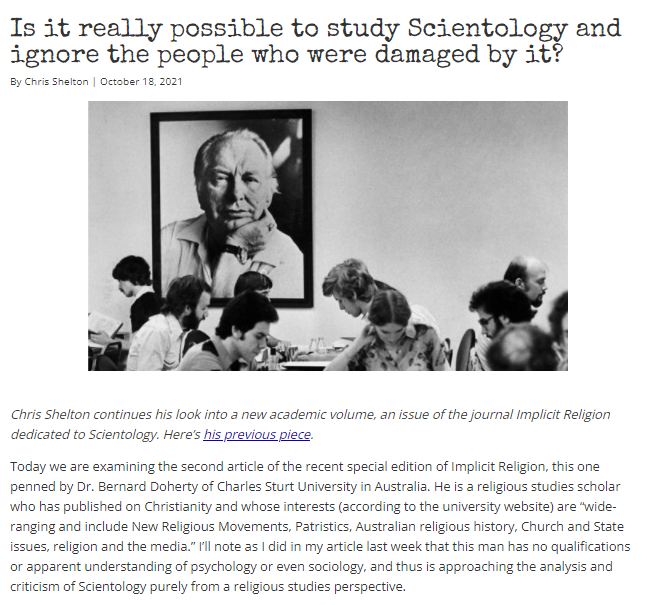
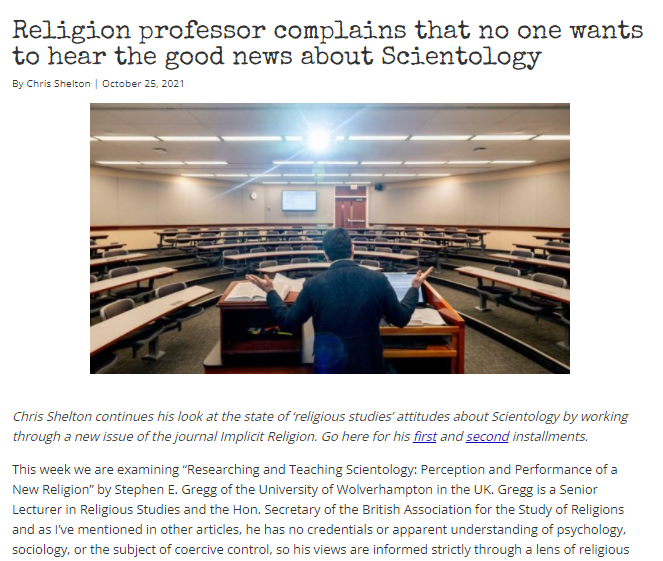
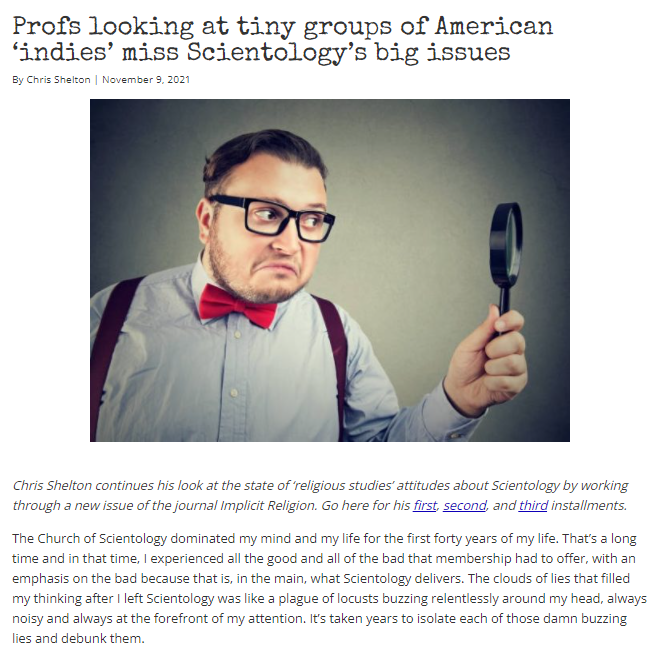
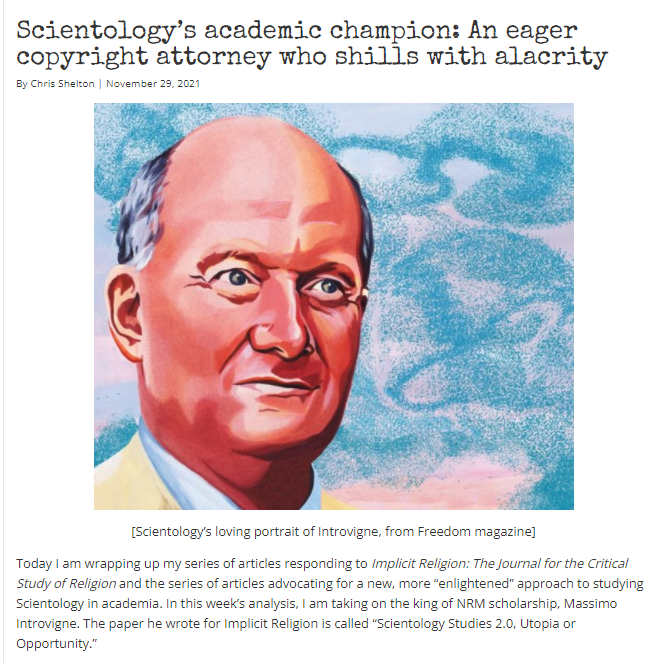
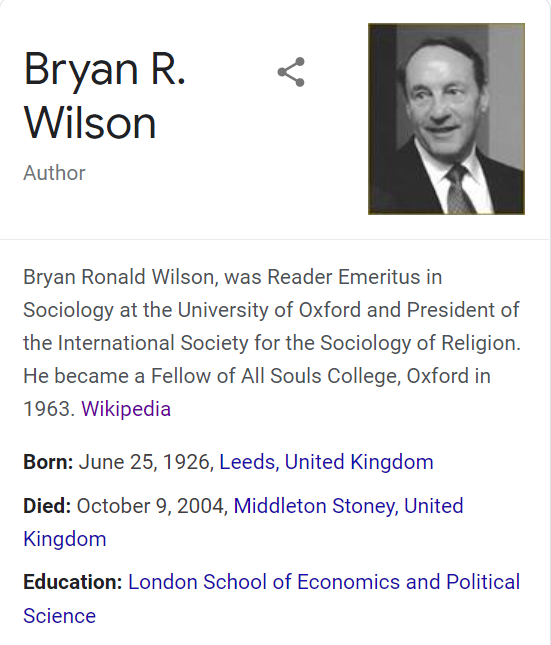
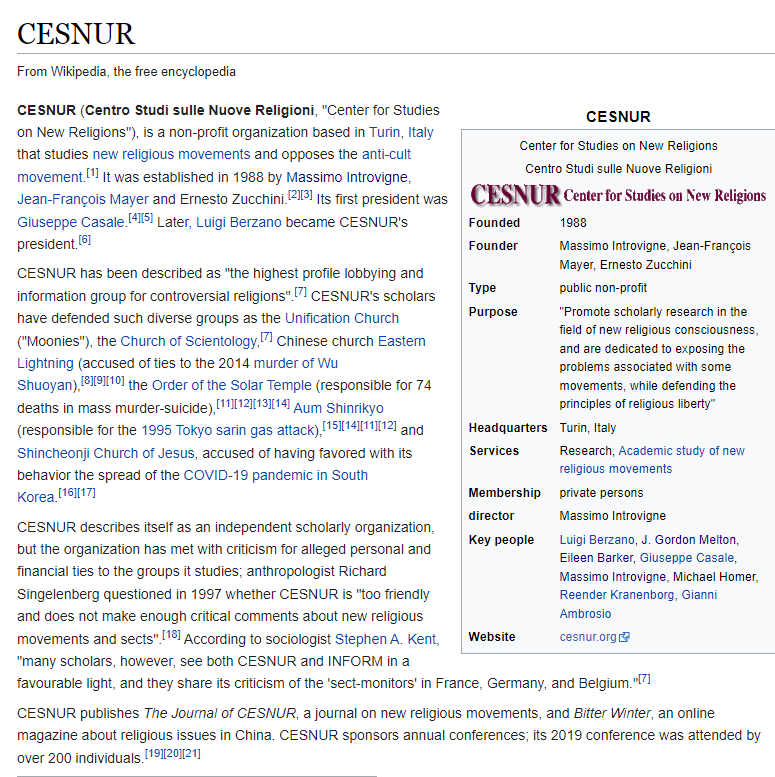
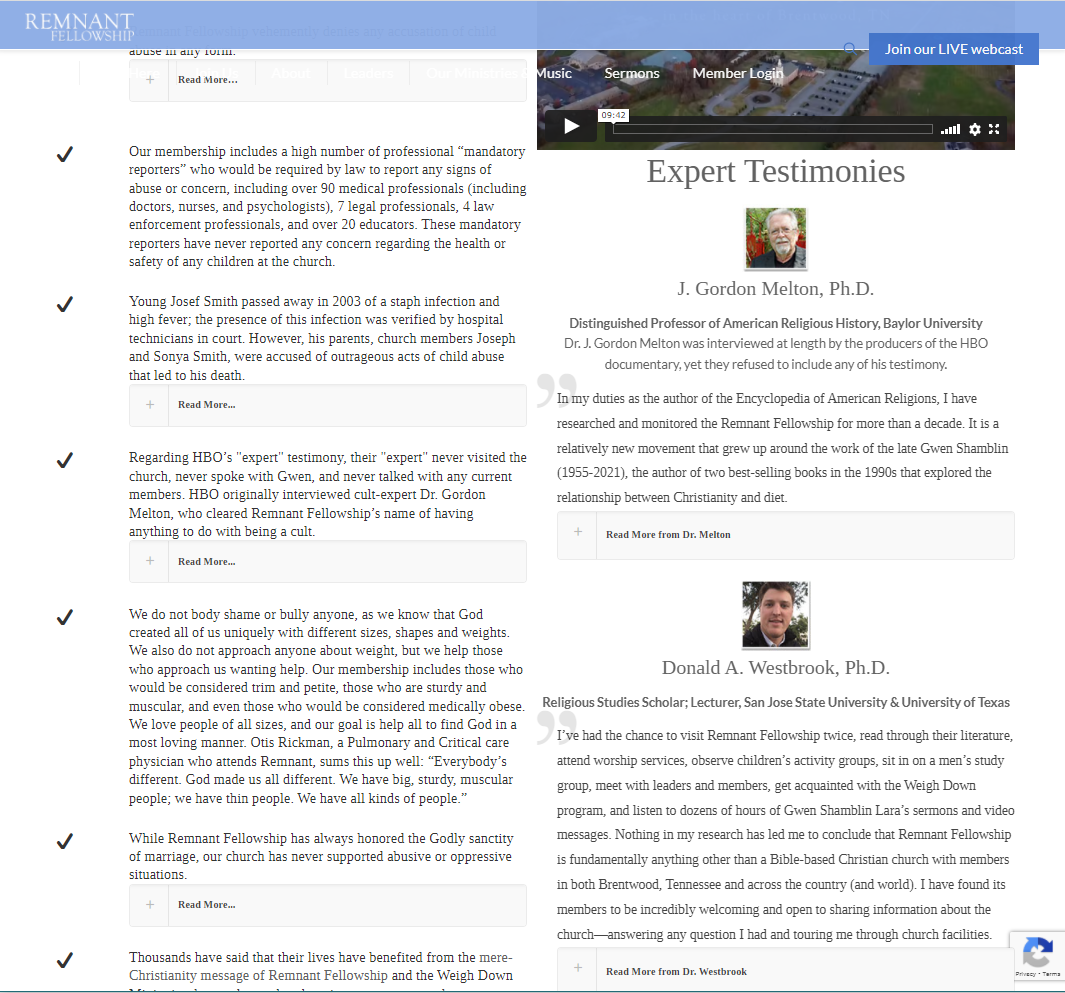




Chris and Leah talk about going back to school to do some work in this field. What department or major would be most effective in doing into research into cults and the like?
NRM (No to Rationality and Mindfulness)
presented by:
STAND (Scientologists Talking Ass Night and Day)

CESSPOOL
Gordon Meltdown
Donald Wastebook
Frying Willy
Eileen Woof
Massive Navelgazing
Observant cult apologists can debrief to the FBI too and have a public report, from time to time, that media can publish, and officials around the world can use quickly.
David Bromley wrote a boor about their difficulty studying the various controversial religions, it has some good arguments.
But really, the bottom line is studying the doctrines and rules, in detail, enough to do a comparison to other religions.
I think a religion report card list of important relevant societally helpful features, and doing reports comparing all, would be good.
All based on the writings and evidence of behaviours continually based on the writings of that religion.
Scientology will show itself to match what the critics and critical media continually report about Scientology.
Religion needs a report card system.
And then grade the academics by how well they think they have graded each religion.
So the academics get their report card based on their understanding of the doctrines and application of the doctrines and the community effects, listing events brought about by the religions’ continuing behaviours.
And do it up 5 year thing, or choose a time frame, or multiple time frames, as media coverage does, and lengthen it out, and see what of the report card actually improves or stays the same.
But a religion report card, argue over the list of grades, and then get it going.
That’d be something that’d be good to do, if not done already.
It’s easy to show cult apologist deficiencies by just quoting Hubbard, or listing out a string of keystone Hubbard writings which tie directly to Scientology’s continuing controversies.
Just laying out good solid line of Hubbard quotes, and references, and tie them to Scientology’s continuing problems.
And then if the freezone is brought up, then show why freezone Scientologists dispense with the nastier of the Hubbard corpus, and bring that up.
Relevant to even why the city of Clearwater has problems, vs other cities with freezone Scientologists, would make the apologists even more effective, and would have a back influence on official Scientology.
But no, that’s too expert for cult apologists, other than to be one of the possible historical facts that actual long term experts would notice in all groups and religions which do evolve and adapt and become slowly less controversial.
And then any expert who really digs into Scientology, more the freezone, and checks out why freezone groups have dispensed with things like the OSA department, and even do a checklist of what are the things that a freezone Scientology group does that official Scientology doesn’t. And then compare that list to what other “major” religions have done and their list of features.
And then compare really the list of what other religions do, to Scientology.
Some kind of report card of religious features, and just list out what the Scientology report card grades are.
But I think overall the apologists aren’t that embracive to do such a report card on all religions, across the boards.
But maybe such report cards have been done, I don’t know.
That’s be the gist of what I would think of doing, if I wanted to today be a newbie “expert” in world religions, and the wannabe religions.
Develop a report card list and then grade them all, and use that report card system to grade the new wannabes.
I want to reply to this with a few ideas.
I have championed critical thinking as an alternative to Scientology, an aid to recovery and further a method to help to reduce cultic relationships, to be used in coordination with other subjects such as psychology and neuroscience.
Many people claim to understand critical thinking and if you ask them what it is most people give a sentence or two or say it is using the rules of Socratic debate. This is less than a tiny fraction of the subject and so when someone believes this is the entire subject they are both ignorant and ignorant of their ignorance and certain they understand what they don’t even know.
I am going to include an excerpt from a blog post I wrote on a lecture on critical thinking given by critical thinking expert Richard Paul.
I often use this to highlight the difference between Scientology and a legitimate subject.
Richard Paul pointed out many relevant issues regarding critical thinking in his lectures. One issue he dealt with is different degrees of understanding of issues.
One lecture in particular is worth serious examination.
It’s on YouTube with the Title Prove: Why Intellectual Standards ? Why Teach For Them ?
From CriticalThinkingOrg published on April 23, 2015 with a length of fifty five minutes and nineteen seconds. This post addresses the content of that lecture.
He described sophisticate believers and vulgar believers. He said vulgar believers really don’t understand the logic of the content, they don’t understand the ideology.
He pointed out that a person could be what he called a vulgar believer. He gave the example of a person who claims to be a Marxist who has a handful of slogans like “seize the means of production, power to the people, down with the bourgeois” and so on. The person never read Marx or any related authors or contemporaries of Marx. The person doesn’t understand ANY of the ideas of Marx besides these slogans in the barest manner possible. They don’t understand the terms in the subject or anything else. They may be willing to die for Marx or Marxism but don’t understand anything about it.
He described sophisticate believers and vulgar believers. He said vulgar believers really don’t understand the logic of the content, they don’t understand the ideology.
He said a step up from a vulgar believer regarding a subject is a sophisticate believer. The sophisticate believer understands the ideas in a subject far more than the vulgar believer. But they are predisposed to not understand how the subject they are aware of can be critiqued by other systems and interacts with subjects outside the one subject they defend. He gave the test that they don’t see the flaws and weaknesses in their system and the answers that other systems can give to incorporate them and improve their system. They are aware of no flaws in their system. They see no other system as necessary. He described them as being able to recite six volumes of very narrow minded reasoning that never entertains another system. Crucially they try to understand the system outside their own system to negate it and defend their own system. He defined this as apologetics and said you ought to apologize for it.
This is worth strong emphasis. He described it as trying to show everyone why you are right and everyone else is wrong all the time.
He described the challenge of critical thinking as trying to get students to not be vulgar believers or sophisticate believers.
Huh ? The examples with this are plentiful in life. It’s a defining characteristic of cultic groups. If you have a philosophy or subject that is only seen as superior to and in conflict with all other subjects that is a huge red flag.
We have various extreme sects that take virtually any religious beliefs and refuse to give any subjects whether scientific or medical or of any other kind a chance to be used to be seen as legitimate also then you have a cult.
In all major religions you also have sects that do not reject all other subjects and get called moderate that are not cultic, so the approach to thinking and degree of control that a subject is enforced with determine a lot.
A sophisticate believer knows enough to attack other subjects, but not usually enough to understand them really as anything other than something to attack and degrade, not really a deep understanding.
Imagine that you see physics as superior to everything else. And you see chemistry and biology as worthless and inferior. And teaching and study as things to not learn because they are not physics.
You would be less capable in physics than you potentially could be obviously because study and teaching are essential to learning physics itself. Other subjects that involve human beings like psychology and influence and our biases and behavior affect ANY subject we interact with as they affect how we do and learn EVERYTHING.
A sophisticate believer has such poor understanding of how subjects can interact and help each other with being applied to each other that they really don’t understand their own subject completely.
Richard Paul described a thinker that understands a subject as itself and how other subjects can interact and be used to evaluate a subject as a critical thinker. If you can look at physics and use the subject of critical thinking to see the strengths and weaknesses in physics you have an advantage. If you can use logic to look at the logic within physics and see what is what you are free to be objective and not just defend orthodox beliefs.
A subject that is too sacred to be observed through the lens of other subjects is immune from criticism and critical thinking. Whatever beliefs one holds of a religious or spiritual or philosophical nature that cannot be treated as anything besides sacred cannot be critically thought of. I have also encountered the phenomenon of people believing in atheism or their idea of critical thinking (what Richard Paul would probably have called a pseudo critical thinker) or a physical science or political philosophy that also is seen as sacred and beyond criticism or evaluation by any other subjects. So, this is not limited to religion in any way.
I hope the three categories of vulgar believer, that really understands nothing and follows a few slogans to the sophisticate believer that understands a subject just as superior to others and might understand it from the inside better than the vulgar believer but not really fully to the critical believer who understands the subject they study and the content in the subject and that other subjects are worthwhile for analyzing the subject in question illustrate how approaches to subjects determine or prejudice understandings that are achieved.
Richard Paul also described indoctrination as producing people that just comply with feeding back what is told to people in indoctrination without even needing to really comprehend the subject or terms. He described indoctrination as producing no understanding of terms or a superficial understanding.
Richard Paul described content as something we produce by the reasoning mind, conceived and constructed by the reasoning mind and one hundred percent dependent on thinking.
People often say they have no time to foster thinking with the content they need to instruct people in. They are describing the rote memorization that is briefly used to just feed back information that is only fed back then forgotten.
In earlier systems like Bloom’s taxonomy knowledge is meant to occur before evaluation. Richard Paul believes this is backwards and only results in brief memorization.
Thinking requires organization of information. All new ideas must fit the existing system of ideas and a mind must change its own content to adapt to needs.
Students must understand the logic of their thinking because it affects their ability to take on any content. To Paul the system in any subject isn’t nature to the mind and so it takes discipline to take on the thinking required in any subject, it’s difficult and not normal for people to seek the truth.
Paul sees his intellectual standards as naturally required for all thinking in all situations for all subjects, that is why they are universal. They are minimum criteria he feels are necessary.
We need clarity, accuracy, relevance, depth, breadth, precision, logic, significance and fairness in our thinking. Imagine presenting something that is unclear, inaccurate, irrelevant, shallow, too narrow minded, imprecise, illogical, insignificant and unfair. It would have no logical cohesion.
Reasoning is the attempt to figure something out in a way that displays the intellectual standards. They are natural criteria.
He feels the standards come from the logic of language, which requires clarity and accuracy, he emphasized the importance of understanding terms that apply to reasoning that are relevant.
He emphasized that most words must remain unchanging if we make a case for changing some words. He says words must be used carefully like indoctrination and training and education, they don’t mean the same thing.
He says you must use words carefully to think clearly.
He said discipline requires a standard to conform to. Whether it is a sport or art or other discipline. He said you wouldn’t understand a language if you had your own private language.
He described the logic of questions as also being a part of the origin of the logic of the standards. A legal question has standards from the law while a moral question has moral standards as the standards for examination.
He described questions of fact as having right and wrong answers and questions of reasoned judgement have a better and worse answer while questions of personal preference have a different answer possible for each person.
He quoted a description of math instruction today as being fraudulent. It is just getting people to plug numbers in equations with no further understanding.
He described the logic of historical reasoning as never occurring in instruction in history.
The logic of reality is the third as being the third component of the logic of the student.
He described the contrast between chemistry which consults the logic of reality and depends on it and astrology which doesn’t. Astrology consults it’s own unverifiable internal non-reality based system and seeks to maintain that system.
He described the ultimate question for a critical thinker as do you confirm your system to the logic of reality or do you conform reality to your system.
He said if reality isn’t what you are trying to conform to your thinking will be deeply flawed.
He said if you try to conform your thinking to reality you are a critical believer. Whether Christian, mathematician, sociologist, American, or whatever. They understand they can make mistakes and the system can make a mistake and they can make a mistake within the system. The system can be falsifiable.
He said if students don’t see something to discipline their reasoning to then they won’t be critical thinkers. He described the difference between beliefs and knowledge. He said educators should work to get students that can achieve knowledge through their reasoning and that anyone can believe but belief doesn’t require reasoning and understanding.
He described disciplines as being constructed by reasoning. He referred to disciplines like anthropology and sociology and biology. He said there are many questions which no discipline has yet answered. There are many questions which have not even been asked yet. He said education is concerned with developing the mind to be able to answer the questions.
He said it is only the uneducated mind that is impressed with how much is known, “the more you know the more you know you don’t know” was his description. He said it takes reasoning and precise use of language to see that.
He described getting students to understand and apply the intellectual standards of critical thinking as a tremendous challenge. It’s a paradigm shift.
He said this is a lifetime endeavor. He recommended looking up the terms for the standards in a good dictionary. He emphasized the differences between the standards and the interrelationships between the standards.
He said the logic of learning is the logic of somebody’s thinking. He said in teaching you should get lots of questions. No questions means no understanding because if you understand something you see unanswered questions not addressed.
He described using questions to encourage students to think more broadly within disciplines and stretching the breadth of what students think of, bit by bit and very gradually.
He said this paradigm is resisted by people that deeply believe in the other paradigm of giving information that is fed back with a little critical thinking thrown in and that critical thinking cannot effectively be taught by people that don’t practice it.
There are people that assume critical thinking is always there when it isn’t at all. Their only standard is memorization of material and feeding it back.
From
https://mbnest.blogspot.com/2018/06/scientology-versus-critical-thinking.html
Holy shit, Mockingbird… you write some serious novels here. But I secretly love it!
I selected from the above:
“…clarity, accuracy, relevance, depth, breadth, precision, logic, significance and fairness …..”
Virtuous characteristics of good critical thinking.
I like the report card model to grade subjects and people.
Just establish the categories to be weighed, and let observers grade for themselves where subjects and people sit on the scales of virtuous characteristics.
The standards are something that Richard Paul describes at length. He worked on the subject of critical thinking for decades and wrote numerous books and educated educators for many years.
If we have considered the value of critical thinking, being open to possibly being wrong, to having doctrine and beliefs that may be wrong and could be falsified by solid evidence and that we may be ignorant of important relevant information and simply believe in incorrect ideas, even if they are long held, to our minds well established and deeply cherished with high confidence then we may be open to critical thinking.
A feature of critical thinking regarding a subject is being open to evidence from other subjects, particularly reality based subjects.
With Scientology a way of showing this is well established by the work of several people, for example Jon Atack has presented a tremendous amount of work in this area.
For example he compiled numerous Hubbard quotes showing that Hubbard knew quite a bit about hypnosis and in many, many, many places in his lectures said that Dianetics and Scientology auditing and indoctrination are in fact hypnotic and he knew it quite well. Hubbard also in turn claimed that they also are not hypnotic.
The examination of the techniques by numerous experts in psychology and psychiatry and hypnosis has produced a tremendous consensus that Dianetics and Scientology are in truth hypnosis used covertly to attempt to mentally manipulate and even enslave people.
An examination of the letters of Hubbard and his most private communication to himself, his self hypnosis commands aka affirmations completely confirms this statement.
Numerous people who have actually bothered to study hypnosis have supported this including Jon Atack, Margaret Singer, Steve Hassan and on and on. In fact when I left Scientology I discovered that students of hypnosis examine the works of Hubbard and are astounded that the general public can’t see that virtually all the materials that Hubbard produced and techniques that are used in Dianetics and Scientology auditing and indoctrination are to them the most obviously hypnotic techniques one could ever devise. They actually just compare the materials and methods and laugh at the boldness of someone to use these methods so overtly while denying it. And the fact that the people in Scientology say that these are not remotely hypnotic.
We also have the legal and profoundly criminal history of Scientology as another reality based subject with which to enhance our understanding of Scientology, including the criminal conviction for fraud of Ronald Hubbard in France and the convictions regarding operation Snow White of numerous Scientology executives in which Hubbard was named as an un-indicted co-conspirator by a judge. We have many, many, many more criminal and civil cases as well.
We can add the reality based subject of the evaluation of the harm and the fraudulent nature of Scientology by experts in the Anderson Report and many other reports by different experts in different countries that occurred at different times.
We have had experts in education who have found study technology to be in fact inferior to other methods of education and experts in mental health who have found that auditing is harmful to the mental health of patients and on and on and on.
So summing up, I don’t think any well educated parent would wish their children become Scientologists, and would fret like crazy if their kids hankered to join Sea Org and “go OT” and help the planet “go OT.” LOL.
I threw out all my apologist academic books, I was going to someday review them, and then try argue against their points, point by point. It’s too much for me, not enough time.
But some of their nagging points I heard personally, from Cowan (he’s not really an apologist though, but he said one thing that’s nagged me for years). He said even if Scientology was founded falsely, if eventually the members believe the stuff, and act “religious” like, and they demand their religious rights, believing it, even if critically thinking wise they are nuts and brainwashed and hypnotised; despite all that, still, they get to call themselves a religion.
So, how to get around that, in the US, where a group can even by false pretense of their founder, even with brainwashing/hypnotising beliefs in their beliefs, still, they get to count themselves as a religion, just by stating so, and having their religion founder say that they are a religion (even though he chose the “religion” angle admittedly).
That’s the report card criticism I have on the USA, and you can feel this, in other subjects.
Pseudo-science crap is still around. Bad religions are still around, and fake bad religions like Scientology with pseudo-science and quackery, are still around.
Free speech in the US at least allows me to say the above, and free speech seems to untie the knots of a self brainwashed hypnotised group started by a founder who admitted taking the religion angle, and who made it group policy for the group to consider itself a religion.
And likewise, the free speech freedom allows the brainwashed/hypnotised self admitted religion angle religion to spew hatred around, do irreligious things, fair game their perceived enemies, and all.
So this goes on.
Untying the Scientologists’ minds from their mental predicament, it goes on too.
——————–
I like the report card model for framing my book, if I ever write one.
The argument is a silly one.
We know Santa Claus is a fictional character. If we use Santa Claus and covert hypnosis to fool people into believing in Santa and we use the techniques of con men and cults to fool people into believing in Santa the fact remains that we are criminals engaging in a crime.
That’s my opinion on the religion angle. Scientology is a harmful fraud. Period.
Simple enough yes.
Good job Chris
I am sure in 50’s and 60’s there were academic papers presented by University professors ,however, as not uploaded on web therefore we missed the literature on cold War era , mind altering experiments and mushroom growth of Cults in USA.
All these factors are interlinked , Cults are always for Control through manipulation of mind and personal behavior.
Indeed. Rather than cold war, mind altering experiments, and mushroom growth of cults, I’d perhaps prefer cults that grow mushrooms, do mind altering experiments, and cold brew. . .
Mike – this is a titanically good episode because it answered a question I didn’t realize I had in re academic study of Scientology and other cults. I was riveted the entire time and will really color my view on the intersection of court proceedings, Scientology, and expert witnesses moving forward. Wishing you all the best and a happy holiday season.
Thank you, I enjoyed this episode even though it left me feeling queasy.
I’m pretty sure you can pay someone to say whatever you want said in legal proceedings. I frequently read opponents ‘expert’ reports and testimony that chartiably may be formed on a lack of knowledge (or general stupidity) but in reality are more likely formed on pure lies.
Often times the theories could have been easily disproven with a 15 minute test. Often times the allegations are not only easily disprovable but contradictory to their other allegations. When those allegations are shown to be false they come up with new allegations. It’s all part of the game to make the process painful so that your adversary will settle or go away. (Does that sound familiar?)
When I took some of those ‘experts’ to task off record (one was a college prof and I asked if he taught that logic to his students) I was basically told that if they don’t provide opinions that support their lawyer’s legal objectives they will not be paid. Good luck finding a lawyer to sue another lawyer for non-payment.
There is a “Daubert” process for excluding testimony that consists of unsubstantiated theories / pseudo science but it is rarely used. As I understand it the “Daubert” motion would prevent this testimony from being presented to a jury. Most legal matters don’t make it to trial so the ‘expert’ can spread his fertilizer grade theories with some impunity. Especially in a case involving psychology and religion where it’s much harder to establish scientific truth.
I wish the non-cult apologists good luck in pushing back against the apologist money train.
Massimo Introvigne, J Gordon Melton, Eileen Barker, and all your little protégés, quiver in your cult-apologist boots — there’s a new scholar in town, and he’s called Chris Shelton!
It was such a blast being on the podcast with you and Leah to discuss this very important topic. The “Cult Wars” have been raging in academia since the 1970s and this is just the latest volley. There is still so much more work to do to turn this around so us former members are actually listened to. Thanks so much Mike for posting all these links to my recent work and podcast. I really appreciate that. I hope everyone enjoys the podcast – we had a great time.
Bravo Chris, fantastic work.
Indeed!
Cult apologists do something that I have noticed is a very important difference between a reality based subject and pseudoscience. They only count the information they agree with, called various terms.
In propaganda analysis it is called card stacking, in debate it is called cherry picking and the Texas sharpshooter fallacy.
I have noticed that proponents of pseudoscience are devoted to it.
A person who disregards a thousand studies that are up to scientific standards to champion one study that is not is doing the same thing.
I have found that Scientology uses this as well. Many Scientologists and ex Scientologists count the handful of people they knew in decades in Scientology who recovered from illnesses and they disregard the hundreds and thousands who did not improve their health with Scientology techniques.
I have met proponents of other harmful frauds, such as NLP who said that all the people that NLP doesn’t work on have particular personality types that make it not work, so they can be conveniently ignored.
Once you are saying that you have a miraculous technology that always works but you can ignore every person it fails to help because of a claim that you have no evidence for, you are on a bad track, scientifically.
The cult apologists conveniently use the genetic fallacy, judging a claim by the source or genesis of the claim rather than evidence, and see no problem in putting all critical information in the category of automatically wrong.
This is of course illogical. Anyone can have a valid claim.
Cult apologists act as if there is a magic doorway. When you leave a cult then you can not make any valid claim. But before you leave, you can.
That is not something any subject that is evidence based should have anything to do with.
If a scientist says that gravity or chemistry or biology has certain qualities that are true then experiments can be devised and carried out to test the hypothesis, or if they can’t then perhaps the ideas can be examined to see if such experiments can be developed.
If we can not test an idea in science then it may be unfalsifiable and outside the arena of science, it might be testable in the future or with a method we have not considered yet, but it is not supported or debunked by empirical evidence.
The magical doorway that cult apologists conveniently believe in puts their work well outside of science, by a lot, and not a little.
They should have this problem they are creating pointed out frankly. Sometimes you have to call a spade a spade and sometimes you have to call it a bloody shovel.
They have been shoveling a lot with their flaccid excuses and should be called out for it, even perhaps ridiculed.
“Sometimes you have to call a spade a spade and sometimes you have to call it a bloody shovel.”
Well damnit, that’s going straight to the GCEQHF (Galactic Cult Exit Quotes Hall of Fame), on a titanium plate.
Thank you
“The phrase “to call a spade a bloody shovel” is first recorded in 1919. ” So, I can’t take credit for this phrase.
I have seen an English person say it and thought it was fitting. Sometimes saying the plain, even offensive, truth is appropriate.
Thank you, galactic citizen. Your modesty shines brighter than a neutron star collision! The origin of the phrase shall be added to the engraving.

Great New Chris!!! You are doing very well what I tried ten years ago with Hugh Urban of
Ohio State and Katherine Wessinger of Loyola New Orleans. Glad to see Tony Ortega on board as well. Great, great news I like your approach; it is far far better than what I did.
Chris did such great work with these pieces! Thanks for talking to him about them. Keep up the great work, “apostates”